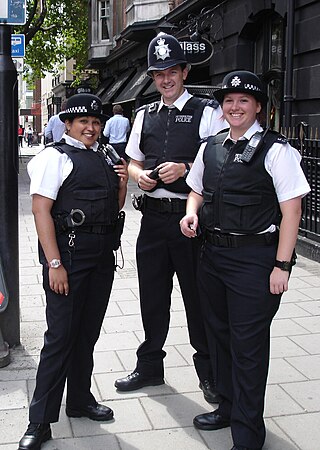
A detective is an investigator, usually a member of a law enforcement agency. They often collect information to solve crimes by talking to witnesses and informants, collecting physical evidence, or searching records in databases. This leads them to arrest criminals and enable them to be convicted in court. A detective may work for the police or privately.

A taser is a conducted energy device (CED) primarily used to incapacitate people, allowing them to be approached and handled in an unresisting and thus safe manner. Sold by Axon, formerly TASER International, the device fires two small barbed darts intended to puncture the skin and remain attached to the target, at 55 m/s. Their range extends from 4.5 m (15 ft) for non-Law Enforcement Tasers to 10.5 m (34 ft) for Law Enforcement Tasers. The darts are connected to the main unit by thin insulated copper wire and deliver a modulated electric current designed to disrupt voluntary control of muscles, causing "neuromuscular incapacitation." The effects of a taser may only be localized pain or strong involuntary long muscle contractions, based on the mode of use and connectivity of the darts.

A police officer is a warranted law employee of a police force. In most countries, "police officer" is a generic term not specifying a particular rank. In some, the use of the rank "officer" is legally reserved for military personnel.
Suicide by cop, also known as suicide by police or law-enforcement-assisted suicide, is a suicide method in which a suicidal individual deliberately behaves in a threatening manner, with intent to provoke a lethal response from a public safety or law enforcement officer to end their own life.

The Federal Protective Service (FPS) is a federal law enforcement agency of the United States Department of Homeland Security (DHS). It is also "the federal agency charged with protecting and delivering integrated law enforcement and security services to facilities owned or leased by the General Services Administration (GSA)"—over 9,000 buildings—and their occupants.
De-escalation is a human behavior that is intended to prevent the escalation of conflicts. It may also refer to approaches in conflict resolution. People may become committed to behaviors that tend to escalate conflict, so specific measures must be taken to avoid such escalation.

The United States Capitol Police (USCP) is a federal law enforcement agency in the United States with nationwide jurisdiction charged with protecting the United States Congress within the District of Columbia and throughout the United States and its territories. It answers to the Capitol Police Board and is the only full-service federal law enforcement agency appointed by the legislative branch of the federal government of the United States.

A prison officer (PO) or corrections officer (CO), also known as a correctional law enforcement officer or less formally as a prison guard, is a uniformed law enforcement official responsible for the custody, supervision, safety, and regulation of prisoners. They are responsible for the security of the facility and its property as well as other law enforcement functions. Most prison officers or corrections officers are employed by the government of the jurisdiction in which they operate, although some are employed by private companies that provide prison services to the government.

The Service de police de la Ville de Montréal is the municipal police agency for the city of Montreal, Quebec, Canada, and the neighbouring communities in the urban agglomeration of Montreal. With over 4,500 officers and more than 1,300 civilian staff, it is the second-largest municipal police agency in Canada after the Toronto Police Service.

Wandsworth Parks and Events Police is a Wandsworth Borough Council service responsible for the routine patrolling of the parks, commons, and open spaces within the London Borough of Wandsworth, which has more green spaces than any other inner London borough. It also enforces byelaws, dog control orders, and other park regulations, and provides policing for special events. Its lineage may be traced to a 1984 foundation, although the present body dates from 2012, and was rebranded in 2015 with its current name and responsibilities.

Law enforcement in Canada is the responsibility of police services, special constabularies, and civil law enforcement agencies, which are operated by every level of government, some private and Crown corporations, and First Nations. In contrast to the United States or Mexico, and with the exception of the Unité permanente anticorruption in Quebec and the Organized Crime Agency of British Columbia, there are no organizations dedicated exclusively to the investigation of criminal activity in Canada. Criminal investigations are instead conducted by police services, which maintain specialized criminal investigation units in addition to their mandate for emergency response and general community safety.

The New York State Office of Mental Health Special Policemen is responsible for providing onsite security and fire safety/prevention services at the 23 state run psychiatric centers located in New York State.
A Crisis Intervention Team (CIT) is a police mental health collaborative program found in North America. The term "CIT" is often used to describe both a program and a training in law enforcement to help guide interactions between law enforcement and those living with a mental illness.

The Gaston County Police Department is a law enforcement agency of Gaston County, North Carolina, United States. It is 1 of only two county police agencies within the State of North Carolina(.)
Antigua and Barbuda is a destination country for a small number of women from Guyana, Haiti, Jamaica, and the Dominican Republic subjected to trafficking in persons, specifically forced prostitution. To a lesser extent, it is reportedly also a destination country for women subjected to involuntary domestic servitude in private homes. Business people from the Dominican Republic and Antiguan citizens acting as pimps and brothel owners subject foreign women to forced prostitution primarily in four illegal brothels that operate in Antigua as well as in private residences that operate as brothels. Some of these foreign women voluntarily migrate to Antigua to engage in prostitution but are subsequently subjected to force or coercion and become victims of sex trafficking. After their arrival, brothel managers confiscate their passports and threaten the victims with deportation until they repay the brothel owner for travel and other expenses they were not aware they had incurred. Some other foreign victims of sex trafficking enter the country legally with work permits as “entertainers” then are subsequently forced to engage in prostitution.

In Canada, carding, officially known in Ontario as the Community Contacts Policy, is an intelligence gathering policy involving the stopping, questioning, and documenting of individuals when no particular offence is being investigated. The interactions take place in public, private or any place police have contact with the public. The information collected is kept on record in the Field Information Report (FIR) database. FIRs include details including the individuals' gender, race, the reason for the interaction, location, and the names of any associates, to build a database for unspecified future use. Officially, individuals are not legally detained, but this distinction is not clear. Carding programs have been shown to consume a considerable amount of police resources, with little to no verifiable results on the level of crime. Carding is also known to contribute to a disproportionate amount of black and Indigenous people being recorded in law enforcement databases. Consequences for Indigenous and racialized populations include mental and physical health problems, loss of trust with the police, disparities within the criminal justice system, and social disadvantage, including potential loss of educational and employment opportunities.

The Law Enforcement (Powers and Responsibilities) Act 2002(NSW) is an Act of the Parliament of New South Wales which governs the exercise of specific police powers in New South Wales. It
Lexipol LLC is a private company based in Frisco, Texas that provides policy manuals, training bulletins, and consulting services to law enforcement agencies, fire departments, and other public safety departments. In 2019, 3500 agencies in 35 U.S. states used Lexipol manuals or subscribed to their services. Lexipol states that it services 8,100 agencies as of March 2020. Lexipol retains copyright over all manuals that they create, even those modified by local agencies, but does not take on the status of policymaker. Critics note that a decision made by Lexipol becomes policy in thousands of agencies and that there is little transparency into how the policy decisions are made.

CAHOOTS is a mental-health-crisis intervention program in Eugene, Oregon, which has handled some lower-risk emergency calls involving mental illness since 1989. In most American cities, police respond to such calls, and at least 25% of people killed in police encounters had been suffering from serious mental illness.
Caniglia v. Strom, 593 U.S. ___ (2021), was a United States Supreme Court case related to the Fourth Amendment to the United States Constitution's "community caretaking" exception.














